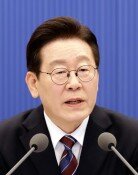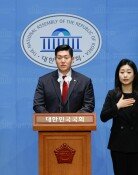Govt to Avoid Angering Public in Administration
Govt to Avoid Angering Public in Administration
Posted June. 10, 2008 08:31,
A presidential office source said, Its like a host preparing many ingredients for a party but not daring to make the food because he is unsure if his guests will like it.
Commenting on the disruption of state administration due to the U.S. beef debacle, he also said, After this year ends, a large part of the drive and opportunity for major state projects could disappear, and this will hurt the public. But its puzzling that the atmosphere does not allow cool-headed discussions about this.
The presidential office says it fears simultaneous implementation of major state tasks could be seen as reckless pushing of agenda and incite more candlelight vigils, and that the administration should handle tasks step-by-step starting with less controversial issues.
First on the agenda is deregulation of the government and the public sector. The decision was made under the consideration that the public will be the first to benefit from deregulation, show by the warm reception of the presidential transition teams war on excessive regulation before the administration was launched.
One official said, Deregulation is aimed at handing over the governments right to regulate and increasing autonomy of the private sector. Mindful of the accusation that only large companies will see deregulation, we can win back the peoples hearts and minds by fine-tuning the policy so that small companies can also benefit from it.
Privatization of public corporations is likely to come in a more selective way, as a sweeping approach will invite resistance from militant unions.
Another official said, The popular idea is to explain how to benefit the private sector with 60 trillion won funds to be raised from privatization and then to start from corporations that need to be spun off.
The planned privatization of the Korea Development Bank and separation of banking and commerce will be promoted to strengthen economic fundamentals in line with the global environment and as a project not to disproportionately benefit conglomerates.
As legislation should handle the majority of major state tasks, the ruling Grand National Party seeks to find a breakthrough for political stability by persuading the opposition to convene the National Assembly.
Furthermore, the party intends to persuade the administration to eliminate or delay politically sensitive issues, including the grand canal project, through working-level meetings and concentrate on improving the peoples livelihood.
ddr@donga.com ditto@donga.com







